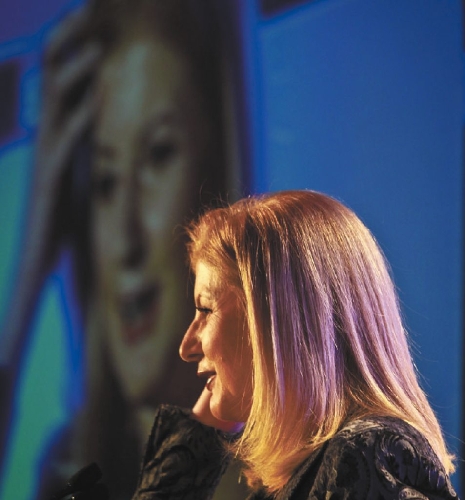CES tackles health-care devices, technology
CES isn't all fun and games, folks.
No, the 2013 International CES also focuses on what is perhaps the less sexy, albeit more important side of consumer electronics: health care devices and technology. And while many of the 156,000 attendees to this year's industry-only show that runs through Friday might never approach a health care company, still many more are eyeing that sector with a laser-like focus.
As the show opened, at least 500 people chose to forgo the floor's first open minutes in favor of a session devoted to digital health care. The discussion was moderated by Arianna Huffington, editor-in-chief of the Huffington Post, who didn't mince words.
"We can agree the health care system is dysfunctional and expensive," Huffington said.
Among other issues, she noted that individuals are becoming increasingly aware that stress is having negative effects on our lives. But, through devices and new technology, people can regain control of their health.
"We now have the devices that can help us become more aware," Huffington said.
Devices such as Proteus Digital Health's digital feedback system for medicine that is going to market in 10 days and will be in the U.S. later this year. The technology includes FDA-approved wearable and ingestible sensors that work together to detect ingestions and physiologic data. Taken with medication, the ingestible sensor captures the exact time of ingestion and helps caregivers determine how your body is reacting to medicine.
"This may sound futuristic. It's not," said Andrew Thompson , co-founder and CEO of Proteus Digital Health.
At Misfit Wearables, founder and CEO Sonny Vu is making fashionable medical sensor products that look more like cuff links than a medical device.
"There is this effect that we think about, having something on your body that would inspire you to be more active, even if it didn't do anything," Vu said.
He wants his product to inspire users to be active but be wearable to any event, whether it's formal or not.
David Daly, head of oncology for Life Technologies, said his job is to improve patient care by bringing clarity to disease. To that end, Life Technologies is working with Cure Forward to aggregate patient information, including genetics, to better understand patient profiles and treatment outcomes.
But, a key challenge is taking the information and synthesizing it for use.
Acutely aware of the gravity of the U.S. health care system, Reed Tuckson, UnitedHealth Group executive vice president and chief of medical affairs, called for action.
"America is in a serious crisis," Tuckson said.
He told the crowd, "You need to understand there's no more room to grow," in terms of health care costs.
"Every company is seriously trapped," he added.
But, he noted that new technologies might be able to slow down the increases in chronic illness, such as obesity or high blood pressure, which could eventually turn the tide.
Deepak Chopra told the audience that sleep, stress management, diet, exercise and maintaining ideal weight are the most important factors in maintaining health. Chopra is releasing a product called Dreamweaver, a digital device that feeds optical and audio signals to your brain from a decreasing frequency of 20 hz to help you sleep better.
And at the 5-year-old SecuraTrac, sales director Robert Tomlinson and CEO Chris Holbert are showing attendees their new vital statistics-tracking app.
The app enables smartphones to communicate with a patch worn on the chest or back that will work together to monitor health conditions, including heart rate, heart beat pattern and falls. SecuraFone instantly sends a text message or email alert to emergency contacts including doctors, caregivers or family members if a significant change in health, such as heart rate, is detected.
"This won't be for your average use case," Holbert said.
No, the app and its corresponding patch are designed for hospital discharges or people with lingering medical conditions.
This year, 44 million health apps are expected to be downloaded.
Through Friday, more than 3,100 consumer electronics companies are displaying 20,000 products in Las Vegas. The show is estimated to bring a nongaming economic impact of $197.3 million to the city, according to the Las Vegas Convention and Visitors Authority.
Contact reporter Laura Carroll at lcarroll@reviewjournal.com or 702-380-4588. Follow @lscvegas on Twitter.

















